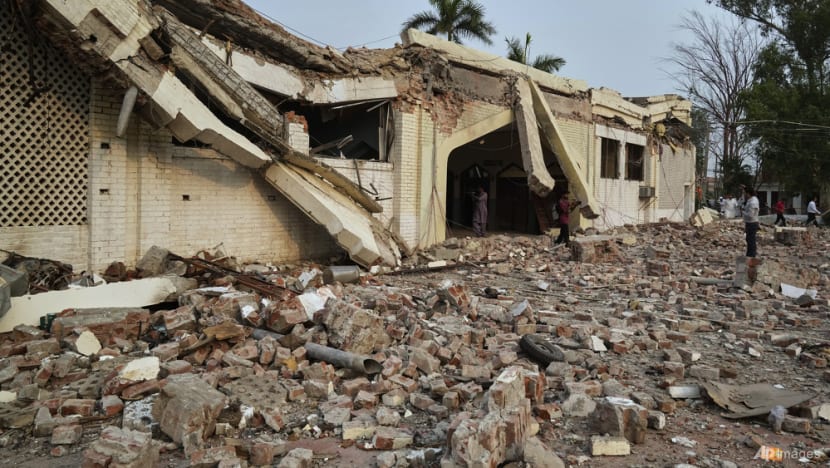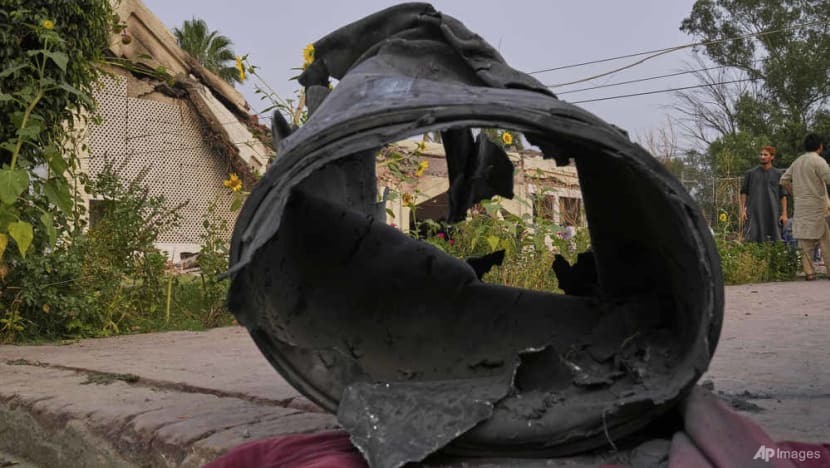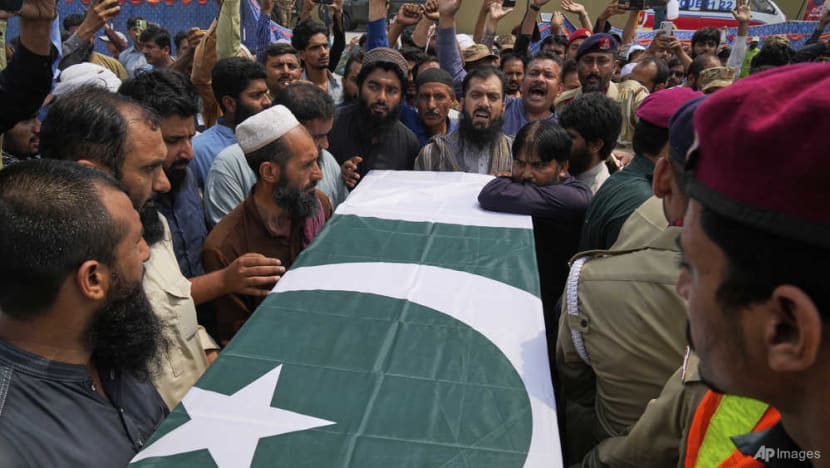Kashmir crisis: India strikes Pakistan over tourist killings, Islamabad vows retaliation
World leaders have issued urgent calls for de-escalation.

The rubble after a mosque was damaged by an Indian missile attack, in Muridke, a town in Pakistan's Punjab province on May 7, 2025. (Photo: AP/KM Chaudary)
NEW DELHI: India and Pakistan exchanged heavy artillery fire along their contested frontier on Wednesday (May 7) after New Delhi launched deadly missile strikes on its arch rival, in the worst violence between the nuclear-armed neighbours in two decades.
Islamabad said 31 civilians were killed by the Indian strikes and firing along the border, while New Delhi reported 12 dead from Pakistani shelling.
India said it had struck nine "terrorist infrastructure" sites, some of them linked to an attack by gunmen on Hindu tourists that killed 26 people in Indian Kashmir last month, with New Delhi adding that its actions "have been focused, measured and non-escalatory in nature".
The Indian strikes included targets in Punjab, its first attacks on Pakistan's most populous province since the last full-scale war between the old enemies more than half a century ago, triggering fears of further hostilities in one of the world's most dangerous flashpoints.
Islamabad pledged to respond "at a time, place and manner of its choosing to avenge the loss of innocent Pakistani lives and blatant violation of its sovereignty", emphatically rejecting Indian allegations it had terrorist camps on its territory.
Pakistan Prime Minister Shehbaz Sharif said in a televised address on state broadcaster PTV to the nation: "For the blatant mistake that India made last night, it will now have to pay the price.
"Perhaps they thought that we would retreat, but they forgot that ... this is a nation of brave people."
Pakistan's Defence Minister Khawaja Muhammad Asif accused Indian Prime Minister Narendra Modi of launching the strikes to "shore up" his domestic popularity, adding that Islamabad "won't take long to settle the score".
He told broadcaster Geo News that Islamabad would only strike Indian military targets and not civilians, in retaliation.
Military spokesman Ahmed Sharif Chaudhry claimed that five Indian jets had been downed across the border, but this was not confirmed by India.
Local government sources in Indian Kashmir told Reuters that three fighter jets had crashed in separate areas of the Himalayan region during the night and their pilots had been hospitalised, but Indian defence ministry officials had yet to confirm this.
The Indian embassy in Beijing later called reports of fighter jets downed by Pakistan "disinformation".
In Muzaffarabad, the main city of Pakistan-administered Kashmir, troops cordoned off streets around a mosque that Islamabad said was struck, with blast marks visible on the walls of several nearby homes.
United Nations military observers arrived on Wednesday afternoon to inspect the site, which was blown out on one side.

Pakistan also said a hydropower plant in Kashmir was targeted by India, damaging a dam structure, after India threatened to stop the flow of water on its side of the border.
Islamabad had earlier warned that tampering with the rivers that flow into its territory would be an "act of war".
The latest violence exceeds India's strikes in 2019, when New Delhi said it had hit "several militants" after a suicide bomber attacked an Indian security force convoy, killing 40.
India had been widely expected to respond militarily to the Apr 22 attack on tourists in Indian-administered Kashmir by gunmen it said were from Pakistan-based group Lashkar-e-Taiba, a UN-designated terrorist organisation.
New Delhi has blamed Islamabad for backing the attack, sparking a series of heated threats and diplomatic tit-for-tat measures, while Pakistan has rejected the accusations amid calls for an independent probe.
According to CNA's correspondent in New Delhi, Modi held a full Cabinet meeting on Wednesday afternoon, briefing members on the military operation that was conducted overnight.
India's Home Ministry, which is in charge of internal security, has asked paramilitary forces to return from leave and to be on standby.
WORLD CALLS FOR CALM
Pakistan's National Security Committee, which convened an emergency meeting led by Prime Minister Shehbaz Sharif and attended by Chief of Army Staff Asim Munir, called on the international community to hold India "accountable".
CNA's correspondent in Islamabad reported a key takeaway from the meeting, with Pakistan, under Article 51 of the United Nations Charter, having the right to respond. This means it will retaliate in the coming days - a sentiment echoed by the country’s military spokesperson following the missile strikes.
Its stance is also that India launched cross-border strikes at civilian areas.
World leaders have since issued urgent calls for de-escalation.
"The world cannot afford a military confrontation between India and Pakistan," the spokesman for UN chief Antonio Guterres, Stephane Dujarric, said in a statement.

US President Donald Trump told reporters in Washington he hoped that the fighting "ends very quickly".
The US State Department said Secretary of State Marco Rubio spoke to the national security advisers of both nations, urging "both to keep lines of communication open and avoid escalation".
Afghanistan's Taliban government warned India and Pakistan that further escalation was not "in the interest of the region".
Concern also poured in, including from China - a mutual neighbour of both nations - as well as from Britain, France and Russia, Germany and Turkey, while airlines, including Singapore Airlines and Scoot, have cancelled, diverted or rerouted flights.
The South Asian neighbours have fought multiple wars over the divided territory since they were carved out of the sub-continent at the end of British rule in 1947.
The two sides have exchanged gunfire nightly since Apr 24 along the Line of Control, according to the Indian army.
Rebels in Indian-administered Kashmir have waged an insurgency since 1989, seeking independence or a merger with Pakistan.
India regularly blames its neighbour for backing armed groups fighting its forces in Kashmir, a charge that Islamabad denies.
On the ground in both countries, many people voiced anger and hostility towards the other.
"Pakistan has been testing our patience. The good thing is India is taking revenge," said Kumar Ravi Shankar, a Delhi lawyer.
In Pakistan, businessman Umbreen Mahar said: "No one in today’s world wants to favour war. But if India continues to slander us and then attack, Pakistan has the right to retaliate and defend its sovereignty."
















